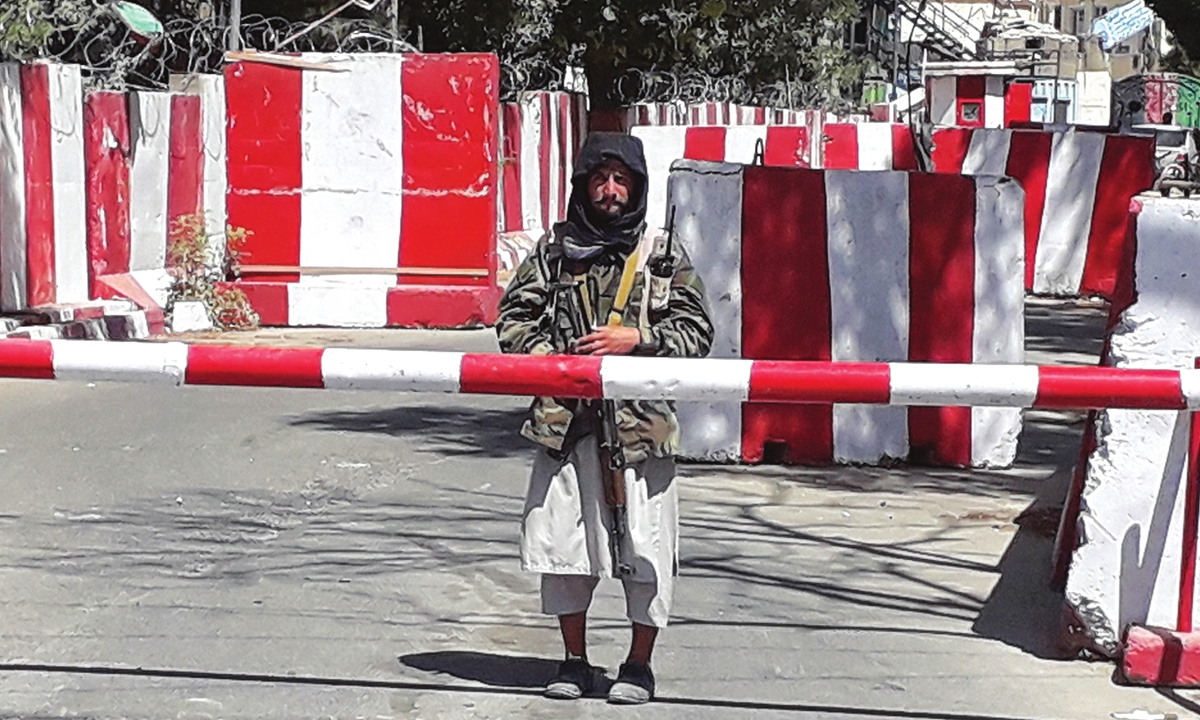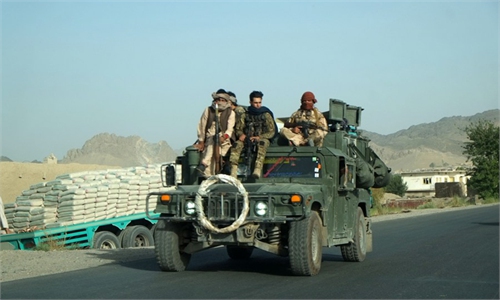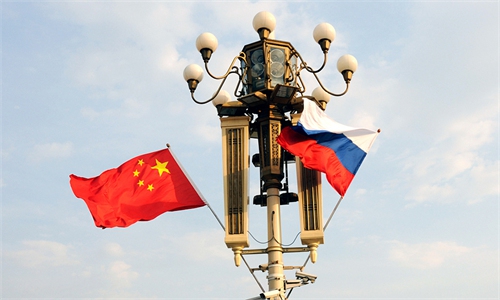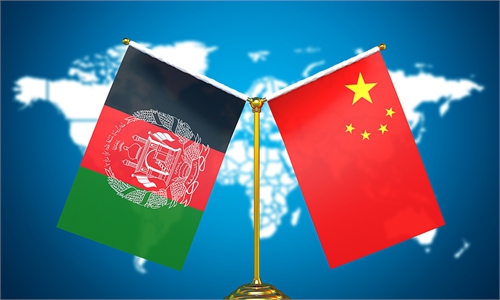
A Taliban fighter stands at the entrance of the police headquarters in Ghazni, Afghan on Thursday, as Taliban move closer to Kabul, Afghan capital, after taking Ghazni. Photo: AFP
Afghan Interior Minister Abdul Sattar Mirzakwal said Sunday that Kabul will not be attacked and that they will shift power peacefully to a transitional administration, according to CNN. Around the same time on Sunday, the Taliban issued a statement saying it was in talks with "the opposing side" for a peaceful surrender of the capital. The Afghan government forces are unable to resist Taliban attacks and defend the capital, which also exposes the embarrassment of the US.First, a scenario similar to the withdrawal of American troops from South Vietnam in 1975 has occurred in Afghanistan, which is the best illustration of the failure of American interventionism.
Second, the US is facing the embarrassment of spending 20 years building the Afghan military without any actual effect. The US has spent at least $4 billion a year on the Afghan military - $74 billion since the start of the war.
But after the US withdrawal, the Afghan government forces are hardly competitive. Moreover, the US faces the embarrassment of an overthrow of the current Kabul government it has helped build in Afghanistan for the past two decades.
Reuters on Sunday published an analysis titled "As Taliban advances, China lays groundwork to accept an awkward reality." It alleged that the Taliban's growing momentum is "awkward" for China. This report ignores the fact that, China has for many years adhered to the principle of non-interference in Afghanistan's internal affairs.
When Chinese State Councilor and Foreign Minister Wang Yi met with the visiting delegation led by head of the Afghan Taliban Political Commission Mullah Abdul Ghani Baradar in Tianjin on July 28, Wang reiterated China's hope that the Afghan Taliban will put the interests of the country first, hold high the banner of peace talks, set the goal of peace, build a positive image, and pursue an inclusive policy.
Totally unlike the US, China has a friendly image in Afghanistan.
Therefore, China will not be an enemy of either party in Afghanistan, and neither party will make China an enemy.
There is no "awkward" reality for China at all.
When analyzing the situation in Afghanistan, some observers noted that China has many cards to play. However, the truth is that China does not want to play any cards in Afghanistan, nor does it want to seek any geopolitical expansion as reported by some Western media outlets.
The fact is Washington will leave Afghanistan in tatters, caused by its 20-year-long war. It also proves that Washington is an "unreliable partner" that always abandons its partners or allies to seek self-interest. Those countries that rely on the US for security should understand from the current predicament in Afghanistan that the US only makes false promises and cares about its own interest.
Western media outlets are fond of playing up the relationship between China and the Taliban, while playing down China's solution to the Afghan issue. They know the US has sunk into the quagmire of the "graveyard of empires" and now they hope that China will get stuck there too.
Why is the Taliban able to regain its momentum despite 20 years of suppression and assault by the US government? Because the US' Afghanistan policy has not only failed to win the recognition and support of vast Afghans, but also it has invisibly helped expand the foundation of public support for the Taliban.
Many US politicians wishfully think that China will intervene in the Afghanistan issue, and they hope that China will eventually get trapped in Afghanistan like the US and its Western allies, consuming a lot of Chinese manpower and material resources.
The fact is that China will never intervene in Afghanistan in the way the US has done in the past 20 years. Instead, China has offered constructive suggestions that are totally different from the US approach, and that may lead to results the US approach can never achieve. This has made many American politicians very upset, feeling like a heavy slap in the face of the so-called US global leadership that its Western allies are proud of.
The author is director of the research department at the National Strategy Institute at Tsinghua University. opinion@globaltimes.com.cn



